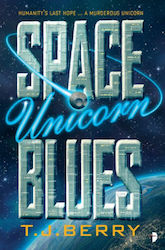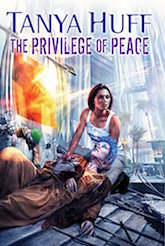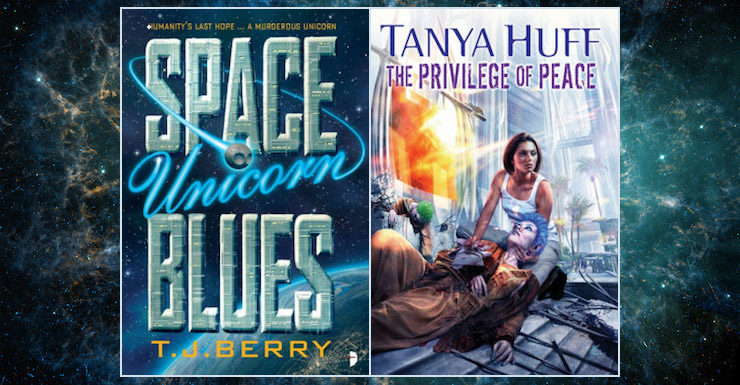I finished reading T.J. Berry’s debut novel, Space Unicorn Blues, and said to myself (and several other people): “Maybe Angry Robot Books is becoming the publisher of queer, feminist, sometimes-angry, sometimes-funny, anti-imperialist novels that we didn’t know we deserved.” Because Berry’s Space Unicorn Blues can join a list that includes (in the UK, at least) Kameron Hurley’s The Stars Are Legion, Tim Pratt’s The Wrong Stars, Foz Meadows’ An Accident of Stars and A Tyranny of Queens, and Jeannette Ng’s Under the Pendulum Sun, and it stands up very well in this company.
Buy the Book


Space Unicorn Blues
I don’t want to spoil the Space Unicorn Blues fun by giving too much detail away. But it’s a fast-paced romp, a story that would be gloriously pulpish if it didn’t stay so aware of the dark side of its worldbuilding, and is still fast, fun, and deeply entertaining. It’s unapologetic about aiming to be inclusive, and it doesn’t pull punches—although it pokes a lot of fun. And its most visible individual villain is a mediocre white man whose villainy mounts because he feels no one gives him the respect which he believes is his due.
I want to take a minute to talk about what it means to me that there are enough books with inclusive approaches to worldbuilding and storytelling that I don’t have to go searching specifically for (e.g.) books with queer women in them as often these days. Granted, part of that is that a number of people tell me, frequently loudly, which books I should keep an eye out for—I may have something of a reputation, at this point—but part of it is that these books have been both more visible and more readily available in the last couple of years.
When I was growing up, there were some books that included queer people in science fiction and fantasy. But—as I remarked when I was talking about Melissa Scott’s work, a few weeks ago—I had very little access to them. The ones I encountered were largely “issue” novels, where the whole point was the struggle of one community (or person with a marginalised identity) to claim the right to exist. Seldom did I see novels, as I do today, where the characters aren’t defined by their existence outside a straight, white, norm—novels where diverse casts of characters go forth and have adventures that aren’t always related to the ways in which they’re different from a perceived straight, white default.
(I’m white, so obviously my perception of where things stand from the point of view of anti-racist work is very incomplete.)
Buy the Book


The Privilege of Peace
It’s a joy to see books like these—and it’s a joy to see Tanya Huff’s The Privilege of Peace, third novel in her Peacekeeper trilogy, set in the same universe and following the same characters as her Valor books.
Torin Kerr is a Warden these days instead of a Gunnery Sergeant, keeping the peace instead of making war. But peace is a rather violent place, with a large number of demobilised former military personnel finding less-than-optimal ways to deploy their skills. And politics have turned against the Younger Races since the end of the war, with some proposals to confine those species of the Confederation who are willing to use violence to their own planets gaining traction. Humans First, the human-supremacist hate group, is organising for something big—and the incomprehensible alien hivemind (the “plastic”) that caused the war in the first place is back for what might be a final showdown.
It’s up to Torin and her team of extremely competent misfits to set things right. And kick ass and take names. The Privilege of Peace is a very fun novel, and a satisfying conclusion to the trilogy.
What are you guys reading lately?
Liz Bourke is a cranky queer person who reads books. She holds a Ph.D in Classics from Trinity College, Dublin. Her first book, Sleeping With Monsters, a collection of reviews and criticism, was published in 2017 by Aqueduct Press. It was a finalist for the 2018 Locus Awards and is nominated for a Hugo Award in Best Related Work. Find her at her blog, where she’s been known to talk about even more books thanks to her Patreon supporters. Or find her at her Twitter. She supports the work of the Irish Refugee Council, the Transgender Equality Network Ireland, and the Abortion Rights Campaign.










